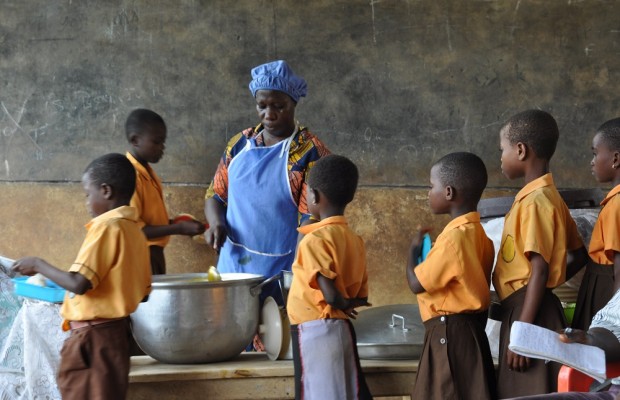Executive Director of Africa Education Watch, Kofi Asare says there was no budgetary allocation to address the challenges facing the school feeding programme.
According to him, given current hikes in food inflation, caterers can barely work with the 97 pesewas per child, a gauge they have been working with since 2018.
“We need to engage more on government for government to increase the school feeding allocation within the medium term budget. As it is now, the caterers are shouting – yes it is true but the reality is that the budget hasn’t made any allocation to solve their problem or give them GH₵3.00 a day,” he said.
Speaking on JoyNews’ AM Show on Tuesday April 4, Mr. Asare lamented the low budgetary allocation to the education sector. According to him, only 12% of government’s total expenditure is allocated to the sector.
This, he said, is one of the lowest in Africa and “far low than the international benchmark of 15% minimum and 20% maximum.”
He also added that the government allocates only 3% of GDP to the education sector, contrary to 4 to 6 per cent recommended by UNESCO.
Touching on the issue of equity, Mr Asare said that government seems to prioritise secondary school education to the detriment of basic education. He says government for the past four years has increased monies for feeding Senior High Schools but has left basic schools without any improvements.
He expressed worry about government’s posture towards feeding programmes at the basic level since caterers at both levels buy foodstuff from the same market.
Meanwhile, the Executive Director has recommended an increase in budgetary allocation to basic education beyond 15% from the current 12%.
“What government must do is that government must increase the budgetary allocation to basic education to 15% from the 12% we find ourselves in,” he added.
He cautioned that without sufficient budgetary allocation to the sector, it would be difficult to manage “critical interventions in the basic education space.”
Latest Stories
-
Walker wants to ‘explore’ Man City exit – Guardiola
2 hours -
Ejura Sekyeredumase MP demands autopsy on resident who died in Police custody
3 hours -
Kusaas Diaspora Union launched to spearhead global unity, development
5 hours -
Bright Simmons: Mahama’s reduction of ministries to 23 amid calls for efficiency, cost-cutting
5 hours -
Maxwell Hanson seeks apology and compensation from Anim Addo over defamation claims
6 hours -
We listen, we don’t judge: What they don’t tell you about being an entrepreneur
6 hours -
Mahama orders Lands Commission to halt sale of State Lands
8 hours -
Chiesa on target as Liverpool ease past Accrington Stanley
8 hours -
Everton appoint Moyes as manager for second time
8 hours -
WACCE describes 2024 elections as one of the violent, deadliest in the 4th Republic
8 hours -
Volta Region movie industry stagnated, needs investors to push – stakeholders
8 hours -
Petition against Chief Justice reflects broader public concerns about Judiciary – Joyce Bawa
8 hours -
Northern Ghana won’t experience fuel shortage – NPA assures
8 hours -
Calm restored in Ejura after mob attack on Police Station
8 hours -
18-year-old herdsman remanded over murder of younger brother
8 hours

